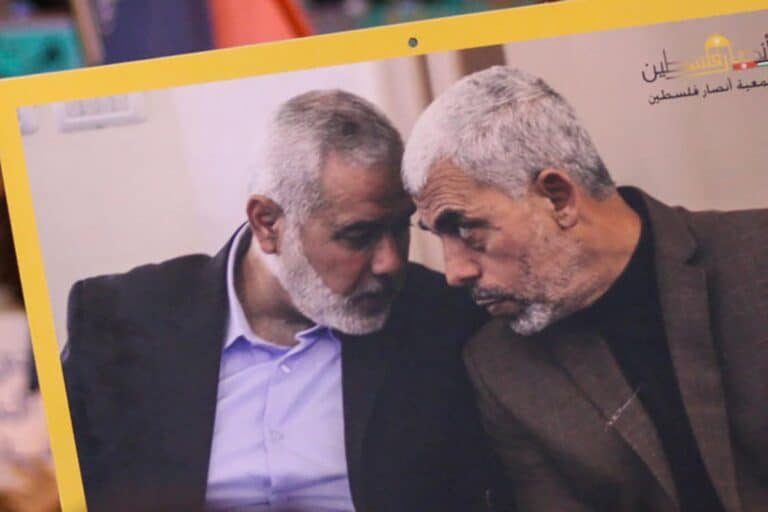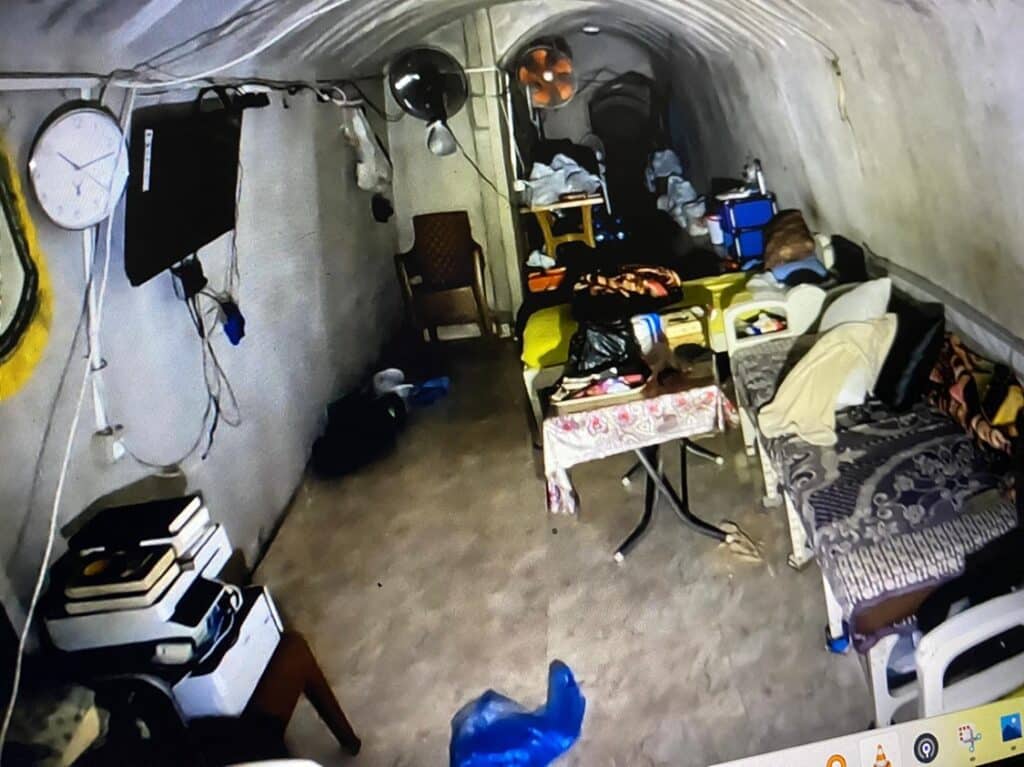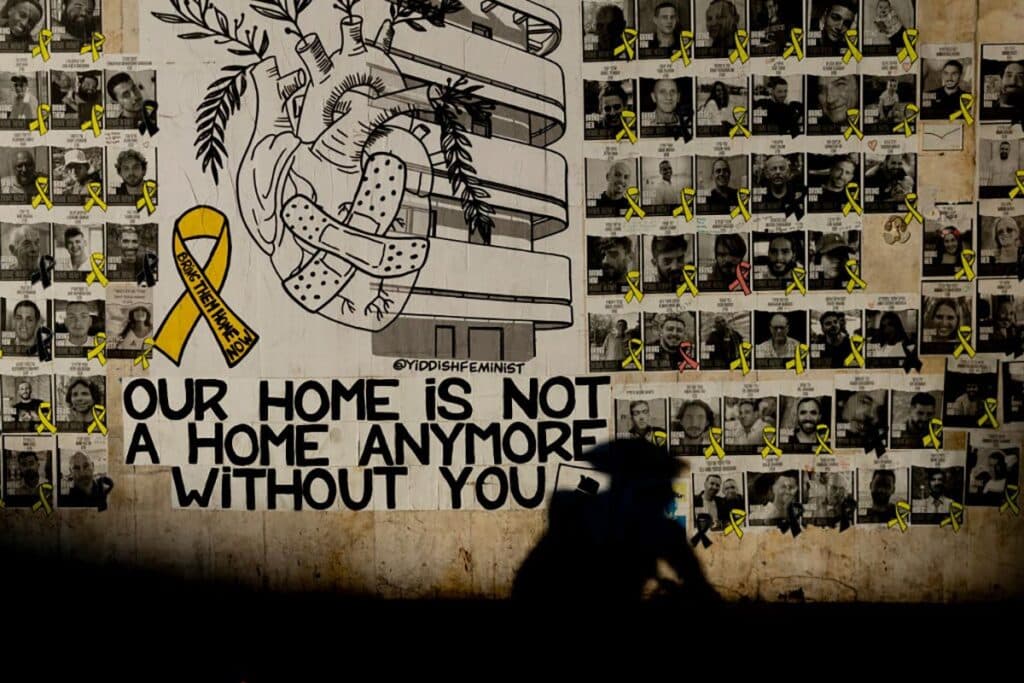
Hamas leader Yahya Sinwar – the mastermind behind the Oct. 7 massacre – was eliminated by IDF soldiers in southern Gaza on Wednesday after a year-long manhunt.
Sinwar topped Israel’s most wanted list since the war began. Several times, the IDF had arrived at tunnels just hours after Sinwar had slipped away.
Sinwar was found almost by accident
The news of Sinwar’s elimination was sudden. While he was largely believed to be in southern Gaza, either in Rafah or Khan Yunis, the IDF didn’t have concrete intelligence about his exact location.
On Wednesday morning, an IDF soldier noticed a suspicious figure next to a building in Rafah. He and other troops in the area launched a search, discovering that three individuals were hiding in the area.
The soldiers surrounded two buildings where the figures had split up, with tanks firing on the structures as soldiers fired toward the suspects, who threw grenades at the soldiers. One soldier was seriously wounded in the fight.
After hours of fighting, the scene fell silent, and the following morning, the soldiers went in and were shocked to find a body that turned out to be Sinwar. The other two terrorists found at the scene were serving as his bodyguards.
According to the IDF, Sinwar had been hiding in tunnels between Rafah and Khan Yunis since the start of the war and only went above ground because he was trying to escape after the IDF neared his hideout.

Sinwar had built a complex under Khan Yunis to hide in, equipped with showers, beds, a kitchen, and other amenities. When the IDF entered the area in February, he fled again to another well-stocked underground complex in the Tel Al Sultan neighborhood of Rafah.
The complex where Sinwar hid was connected to the tunnel where six hostages – Hersh Goldberg-Polin, Eden Yerushalmi, Ori Danino, Alex Lobanov, Carmel Gat, and Almog Sarusi – were murdered by their Hamas captors in late August, shortly before the IDF reached them, although the complex was located a few hundred meters away.
When Sinwar was eliminated, he was carrying sensitive documents containing valuable intelligence, as well as tens of thousands of dollars in cash, which was likely meant to be used as part of an escape plan.
“The leaders of the terrorist organization Hamas, whoever they are, do not care about the price that the residents of Gaza pay, they just use them as a human shield, and are concerned only with their personal survival,” said IDF Spokesman Daniel Hagari on Saturday night.
“Killing Sinwar is the result of a year of operational and intelligence efforts to bring him and other Hamas leaders to justice. Sinwar has been eliminated, but our mission is not over.”
— Israel Defense Forces (@IDF) October 19, 2024
Watch IDF Spokesperson RAdm. Daniel Hagari’s statement regarding the impact of eliminating… pic.twitter.com/INbLoMWBJx
“As can be seen throughout, Sinwar cared first and foremost about himself and his personal survival. An example of this is the amount of money he kept wherever he stayed,” added Hagari. “After his elimination there are those who try to restore his honor. Sinwar lived and behaved like a wanted terrorist on the run and thus he ended his life.”
Will ceasefire talks resume?
Israeli and American officials publicly expressed optimism that Sinwar’s elimination would remove the main obstacle to reaching a deal.
A source in the Israeli defense establishment told Israeli media that Sinwar’s elimination had placed Israel in its “strongest spot” and that “the best time to make a deal is now.”
Prime Minister Benjamin Netanyahu called on Hamas terrorists holding hostages to release them after Sinwar’s elimination, offering them immunity and safe passage out of Gaza if they did so.

US National Security Communications Advisor John Kirby insisted that Sinwar was the main obstacle to a ceasefire, adding that his death provides “a unique opportunity.”
Others expressed doubts that Sinwar’s elimination would change much regarding the negotiations.
Omri Lifshitz, the son of Oded Lifshitz – who was taken hostage by Hamas on October 7th, expressed concerns that Sinwar’s elimination could lead to the hostages being harmed.
“If there is a replacement, he will not be better than him. If there is no replacement – I fear that some of the hostages will be murdered or that their traces will be lost forever,” said Lifshitz.
Hamas issued a statement on Saturday reaffirming that they had not changed their demands concerning a hostage release deal and were still insisting on a complete withdrawal of the IDF from Gaza and the release of hundreds of Palestinian terrorists.
In Gaza, some expressed hopes that Sinwar’s death would allow an end to the war. One resident of Khan Yunis, Shorouq Abu Hammad, told the New York Times. “The first moment I heard [of] his death, I felt relieved that finally we will have a truce or ceasefire on the ground.”
“Sinwar is the one who planned all of this, and now it is a normal outcome that he be killed,” said Abu Hammad.
Others weren’t so optimistic.
“He is gone now, and we will see what he has left behind,” said Ahmed Awad, another resident of the Gaza Strip, to the New York Times.
Can Hamas survive losing Sinwar?
Alongside uncertainties about the future of ceasefire talks, the future of Hamas as a whole is now unclear.
Sinwar was a leader accepted by all branches of Hamas. The remaining leaders are more divisive.
Hamas leader Khalil al-Haya is more pro-Iran, while Khaled Mashaal, another leader in the movement, is opposed to Iran since he supports the opposition movements in Syria which Iran suppressed.
Israeli researcher and lecturer Idit Bar noted this week that Muhammad Ali Al Husseini, a Lebanese Shi’ite cleric, believes that Sinwar’s elimination will lead to Hamas splitting in two: one side staying close with Iran, led by Al-Haya, and the other opposing Iran, led by Mashaal.
Sinwar was also the main leader of Hamas in Gaza since many of the other central leaders live outside the Strip. With him gone, it may be harder to keep Hamas from splitting into smaller groups as disagreements grow. However, some other Hamas leaders remain in Gaza, including Sinwar’s brother, Muhammad Sinwar.
Will Sinwar’s elimination affect Israel’s plans concerning retaliating against Iran’s missile attack?
Sinwar’s elimination is unlikely to stop Israel from carrying out a retaliation against Iran in light of the missile attack that targeted Israel earlier this month, even at risk of delaying ceasefire efforts.
Israeli officials have continued holding meetings to plan the response. U.S. President Joe Biden has even said he knows when the retaliation will be launched and what will be targeted.
